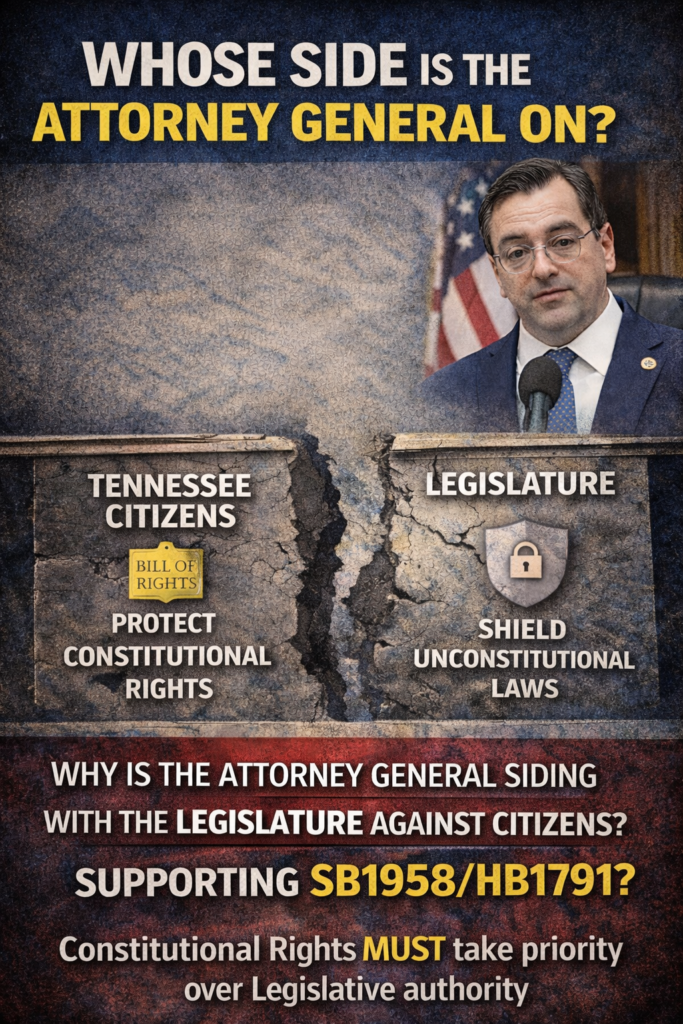Tennesseans must treat Senate Bill 1958 (HB1971) as a serious constitutional alarm bell. This proposal by Republican Legislators (Senator John Stevens and Representative Andrew Farmer) is far more than a technical procedural revision as Stevens suggested to the Senate Judiciary. At its core, SB1958 would dismantle the ability of Tennesseans to file declaratory judgment actions challenging whether state statutes violate the Tennessee or United States Constitutions unless the individual has already suffered damage. That is, the statute seeks to ban facial and pre-enforcement challenges claiming that state statutes are unconstitutional.
Declaratory judgment laws have long served as a peaceful, orderly mechanism allowing citizens to ask courts a fundamental question: Is this law constitutional? Crucially, they permit that question to be asked before a citizen must risk prosecution, penalties, financial loss, or other harm. Eliminating that safeguard alters the balance of power between the government and the governed.
Reports have indicated that SB1958 may have originated not from citizen demands, but from within the Tennessee Attorney General’s office itself (see Tennessean news story). If that account is accurate, Tennesseans must confront an uncomfortable but necessary inquiry that goes far beyond the Legislature’s attack on their rights. Tennesseans must also ask: Why would the state’s highest legal officer seek legislation that blocks and at a minimum significantly narrows citizens’ access to judicial review?
The Attorney General is widely understood by the public to be a guardian of lawful governance, swearing to God to support both the federal and state constitutions. That oath reflects fidelity to constitutional limits, not to legislative enactments. Indeed, the oath is silent as to any duty to defend legislative enactments that violate the constitutional boundaries that citizens have imposed on government authority. Any initiative – even if it originated from the Attorney General – perceived as making it more difficult for citizens to test the constitutionality of statutes demands exacting scrutiny.
Equally revealing is the structure and publicly stated mission of the Attorney General’s office. The office includes a Civil Rights Enforcement Division, which is described by Skrmetti’s office as focusing primarily on discrimination in housing, employment, public accommodations, and education. While undeniably important, nothing in that description suggests an express mandate to protect citizens when alleged constitutional violations arise directly from legislative acts or state statutes themselves. Tennesseans may reasonably ask whether any division within the Attorney General’s office is explicitly tasked with defending the people’s practical ability to challenge unconstitutional laws. And, if not, is that something that needs to change.
The Attorney General’s office also includes a Special Advocacy Section, housing units with titles that imply constitutional functions. The Strategic Litigation Unit is described as handling complex affirmative litigation and defending separation-of-powers principles and constitutional interests.
Then there is the Constitutional Defense Division which is described as protecting the will of Tennesseans as expressed through their elected government. However, that language is deceptive. It actually emphasizes defense of governmental actions against the will of Tennesseans as expressed in their constitution. Thus, rather than safeguarding citizens’ access to judicial remedies when government actions are alleged to exceed constitutional boundaries this Division appears to exist to protect the perceived power of government officials against the citizens even when that power is abused. This Division’s job is to defend the actions of the Legislature or the Governor when Tennesseans bring lawsuits asking the judicial branch to determine whether a state law violates the constitution. There is nothing on the Attorney General’s website to indicate that the Constitutional Defense Division is actually dedicated to defending the constitutionally protected rights of Tennesseans – just the contrary.
These distinctions matter. Titles can inspire confidence, but missions define priorities. And, the priority is not to maximize constitutional rights of Tennesseans. It appears instead that the priority may be to defend and preserve government action even when it likely violates constitutional authority.
SB1958/HB1971 therefore raises concerns extending beyond any single policy dispute. Declaratory judgment procedures are not loopholes, technicalities, or litigation gamesmanship. They are structural instruments preserving constitutional order. They allow courts — the branch specifically charged with interpreting constitutional limits — to perform that duty without forcing citizens into unnecessary jeopardy. Requiring citizens to first suffer enforcement, punishment, or economic damage before obtaining judicial review weakens the practical enforceability of constitutional guarantees. Rights that cannot be timely tested are rights placed at risk.
Further, the question of who is pushing for the changes embodied in SB1958/HB1971 raises even broader questions for Tennesseans. Is it necessary that the state’s constitution be changed to require a publicly elected Attorney General whose first priority will be actually to enforce the constitutions when necessary against government violators?
Tennesseans must understand that constitutional governance depends on friction between branches — not insulation from review. Legislators swear to uphold the Constitution but frequently do not. Courts exist to interpret the Constitution but not to make policy. Citizens retain the sovereign right to invoke judicial review when they believe constitutional boundaries have been crossed. Any legislation perceived as shielding statutes from scrutiny, delaying review until after harm occurs, or narrowing access to the courts should trigger immediate civic engagement and outrage directed at the public officials who so brazenly seek to “defend the king” against the actual sovereignty of the people.
This is the moment for vigilance, not passivity. Contact your legislators. Demand clear explanations of what SB1958/HB1971 changes and why. Ask specifically whether it limits pre-enforcement constitutional challenges. Ask who requested it. Ask how citizens are expected to protect their rights the Legislature bans declaratory remedies. Attend hearings. Inform neighbors. Engage local media. Constitutional accountability rarely erodes through dramatic declarations — it more often contracts quietly through procedural revisions that escape widespread attention.
Tennessee’s constitutional framework ultimately rests not only on elected officials and judges, but on an informed and active citizenry. When proposals arise that reshape or eliminate access to judicial review, silence is not neutrality — it is surrender of oversight. Now is the time to question, to examine, and, where warranted, to oppose.
Grassroots Engagement
Some citizens are seasoned defenders of their rights and others might be more closely aligned with the “sleeping giant” that has not yet become aware that some of Tennessee’s Legislators and perhaps its Attorney General are attempting to take from them the fundamental tool of access to the courts.
Here are some suggested approaches to phone calls and emails that you can modify and adopt to your needs:
Legislator Phone Call (sample – edit to your preference)
Hello, my name is ___, and I’m a constituent from ___ (city/zip). I’m calling to express my strong opposition to Senate Bill 1958 by John Stevens and House Bill 1971 by Andrew Farmer.
These bills seek to block Tennesseans’ ability to bring declaratory judgment actions to challenge whether a state statute violates the Tennessee or United States Constitutions. Declaratory judgment procedures are a long-standing safeguard that allow citizens to seek judicial review before risking penalties or enforcement harm.
Please let the Senator/Representative know that I oppose strongly limiting pre-enforcement constitutional review. Doing so weakens my ability to protect my rights and disrupts the balance of powers between the citizens and the Legislature in which the courts merely serve to enforce the constitution.
I respectfully ask:
- Does the my House (or Senate) member support or oppose SB1958/HB1971?
- Will they oppose any measure that narrows citizens’ access to judicial review of the constitutionality of statutes without the requirement that I submit to arrest or conviction before I have “standing” to seek judicial review?
- Will my House (or Senate) member make a publicly statement opposing this legislation?
Thank you for your time. I would appreciate a response outlining the member’s position.
Short Voicemail Version (sample – edit to your preference)
Hello, this is ___ from ___ (zip). I’m calling to urge opposition to SB1958/HB1971. Declaratory judgment actions allow citizens to challenge potentially unconstitutional statutes before suffering harm. I oppose this legislation and am requesting that my legislator contact me to state their position. Thank you.
Legislator Email Script (sample – edit to your preference)
Subject: Please Oppose SB1958/HB1971 – Protect My Rights to Judicial Review
Dear Senator/Representative ___,
I am a constituent from ___, and I am writing to express strong opposition to Senate Bill 1958 / House Bill 1971.
This legislation removes Tennesseans’ ability to file declaratory judgment actions challenging whether state statutes violate constitutional limits. Declaratory judgment procedures are not technicalities; they are essential mechanisms that allow citizens to seek judicial review without first risking prosecution, penalties, or financial harm.
Limiting pre-enforcement constitutional challenges raises serious concerns about:
• Citizens’ practical ability to protect constitutional rights
• The judiciary’s role in interpreting constitutional boundaries
• The balance of powers among branches of government
I respectfully request:
- Your position on SB1958/HB1971
- Your assurance that you will vigorously oppose this legislation and any other legislation that would weaken citizen access to the courts to question the constitutionality of state statutes
- A public explanation of the problem this bill is intended to solve
Regardless of party affiliation, Tennesseans benefit from transparent laws that preserve access to judicial review and constitutional accountability.
Thank you for your service and your attention to this matter. I look forward to your detailed response.




